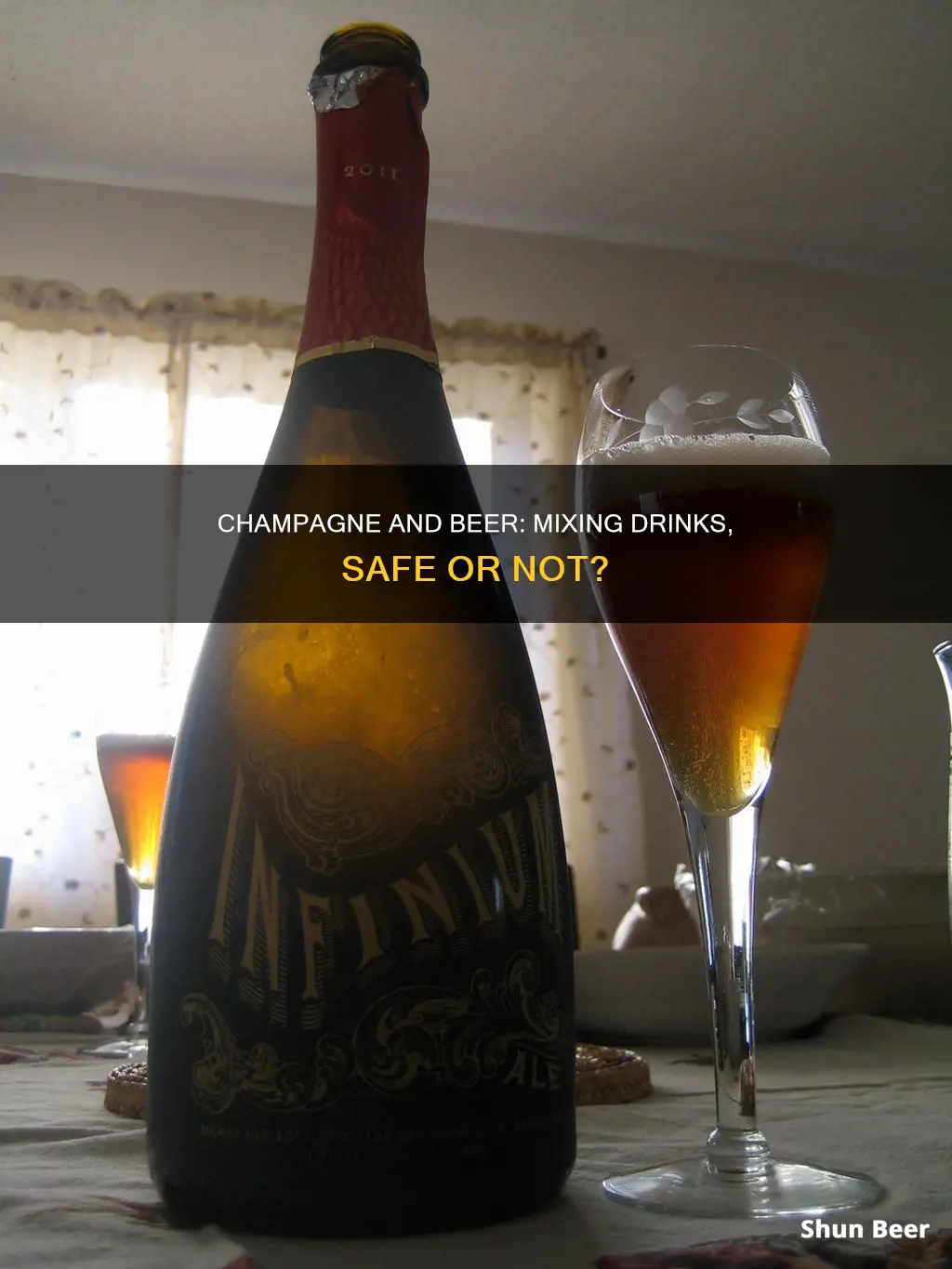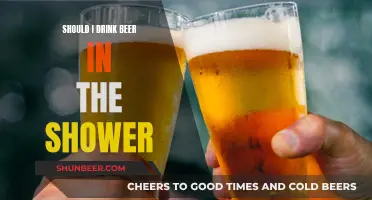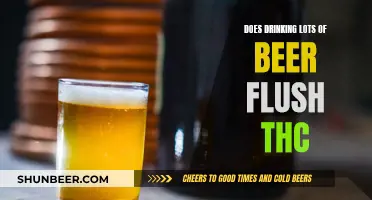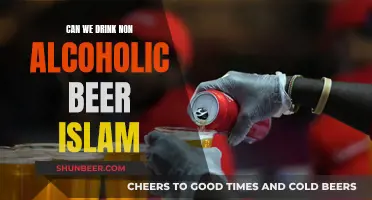
There are many old sayings about the order in which alcoholic drinks should be consumed, such as beer before liquor, never been sicker and beer before wine makes you feel fine, wine before beer makes you feel queer. But is there any truth to these claims? Some people believe that drinking carbonated beverages like beer and champagne irritates the stomach lining, increasing alcohol absorption and leading to faster intoxication. However, experts like Dr. Roshini Rajapaksa attribute intoxication levels primarily to the total quantity of alcohol consumed, rather than the combination of drinks.
| Characteristics | Values |
|---|---|
| Beer before champagne | May lead to quicker intoxication |
| Champagne before beer | May cause alcohol in the stomach to rush to the small intestine, where it is more quickly absorbed |
| Beer and champagne | Mixing drinks may lead to a worse hangover |
What You'll Learn

Beer before champagne may get you drunk faster
It is a well-known saying that "beer before wine makes you feel fine, wine before beer makes you feel queer." But is there any truth to this?
It turns out that beer before wine may indeed get you drunk faster. Carbonated drinks like beer and sparkling wines can irritate the lining of the stomach, increasing the rate of alcohol absorption. Beer also contains a lot of CO2, which can cause alcohol to "hit the head" faster. Drinking wine after beer may cause the alcohol already in the stomach to rush into the small intestine, where it is more quickly absorbed.
However, the effect of carbonation on alcohol absorption varies from person to person. One study found that adding a carbonated mixer to vodka increased the initial rate of alcohol absorption by about 50% on average, but this rate varied widely among the volunteers. Three of the 21 volunteers absorbed the bubbly cocktail more slowly, and for four subjects, carbonation made no difference.
The belief that beer before wine is better may also be due to the lower alcohol content of beer. Starting with wine or spirits may impair judgment, leading to drinking more heavily later.
So, while there is some truth to the saying, the main factor influencing intoxication is the total quantity of alcohol consumed, not the order in which drinks are consumed.
A Beer Kegerator's Working: Understanding the Basics
You may want to see also

Beer before champagne may not make you sicker
There is a popular saying that goes, "beer before liquor, never been sicker," and its variations, including "beer before wine makes you feel fine, wine before beer makes you feel queer." This saying discourages mixing drinks, especially in the order of beer before champagne or any liquor or wine. However, there is little scientific evidence to support this claim. While carbonated drinks like beer and sparkling wines can irritate the stomach lining and increase alcohol absorption, the primary factor influencing intoxication and sickness is the total quantity of alcohol consumed, as explained by Dr. Roshini Rajapaksa, a gastroenterologist.
The belief that beer before champagne will make you sicker may stem from a few factors. Firstly, carbonation is thought to increase alcohol absorption. When beer is consumed after champagne or wine, the alcohol already in the stomach is rushed into the small intestine, where it is absorbed more quickly. This can lead to a faster onset of intoxication. However, this effect is not solely due to mixing drinks but rather the high carbonation of the second drink. Additionally, the order of consumption may influence drinking patterns. Typically, people start with beer and move on to liquor or wine later in the night. As a result, they may attribute their sickness to the stronger drink when it is actually due to the total amount of alcohol consumed.
Another factor contributing to the belief is the difference in alcohol content between beer and champagne or wine. Beer typically has a lower alcohol content than wine or champagne. When individuals start with beer and then switch to a drink with higher alcohol content, they may be less likely to pace themselves and may consume the second drink more quickly. This can lead to increased intoxication and sickness. However, this is not due to the mixing of drinks but rather the change in alcohol content and drinking behavior.
While there may be some minor effects of mixing carbonated drinks, the idea that "beer before champagne makes you sicker" is largely unsupported by scientific evidence. The key determinant of intoxication and sickness is the total amount of alcohol consumed, regardless of the order or combination of drinks. Additionally, consuming food along with alcohol can help slow absorption and minimize sickness. Therefore, while individuals may have their preferences and superstitions, the order of drinking beer and champagne is unlikely to significantly impact how sick one feels.
Drinking NA Beer: Safe Driving or Not?
You may want to see also

Beer and champagne have different alcohol contents
Beer and champagne have vastly different alcohol contents, with beer containing around 5% ABV and champagne containing about 12% ABV. This means that, when drinking comparable amounts, you may get drunk faster from drinking champagne than from drinking beer.
Champagne's higher alcohol content is due to its fermentation process. The grapes used in champagne are not very sweet, so there isn't a lot of sugar for the yeast to eat during the first round of fermentation. After this first round, the wine is only about 9% alcohol, which is pretty low for a glass of champagne. The carbon dioxide produced during this step is allowed to escape, so no bubbles form.
In the second round of fermentation, winemakers add extra sugar and more yeast. Then, they cap the bottle, sealing everything inside. The yeast ferments the sugars and produces more carbon dioxide and alcohol. This process also results in the subtle nutty aromas found in most good champagnes.
The amount of alcohol in champagne doesn't vary much, but you'll generally find that a sweeter style will have a lower alcohol content than a drier bubbly. Additionally, champagne's bubbles can affect people differently. Some people believe that carbonation increases alcohol absorption, causing the alcohol already in the stomach to rush into the small intestine, where it is more quickly absorbed. This could lead to faster intoxication when drinking champagne after beer.
However, it's important to note that the total quantity of alcohol consumed, not the combination of drinks, influences intoxication and sickness. Starting with a drink that has a lower alcohol content, like beer, may lead to less intoxication if followed by a drink with a higher alcohol content, like champagne. This is because the lower alcohol content can slow down your consumption and impair your judgment less, leading to you drinking less overall.
Beer and Amoxicillin: Is It Safe to Drink?
You may want to see also

Beer and champagne have different carbonation levels
Beer and champagne have vastly different carbonation levels. Champagne has twice the carbon dioxide level of beer. The amount of carbonation in bottle-conditioned beer is dependent on the residual level of carbon dioxide after fermentation and the carbonation obtained from the priming sugar. Champagne has 250 million bubbles per glass.
Carbonated drinks like beer and sparkling wines tend to irritate the stomach lining, increasing the rate of alcohol absorption. This is why drinking beer after champagne may lead to quicker intoxication. However, some sources claim that the total quantity of alcohol consumed, not the order in which drinks are consumed, influences intoxication and sickness.
The bubbles in champagne are thought to make the alcohol enter the drinker's system faster. A study at the University of Surrey's Human Psychopharmacology Research Unit found that alcohol levels rose much faster among those who drank fizzy champagne compared to those who drank flat champagne.
The higher carbonation in champagne, compared to beer, may be due to the absence of proteins in champagne. While beer has proteins and other "solids" that create more nucleation sites, champagne is made from grape must and lacks these proteins. This means that champagne requires higher carbonation to foam, but the foam will be very short-lived.
Beer and Type 2 Diabetes: What's Safe?
You may want to see also

Beer and champagne are served differently
Storing Beer and Champagne
Beer and champagne should be stored at different temperatures. Champagne should be stored in a cool place, at a constant temperature of between 10 and 15°C, while beer can be stored at room temperature.
Glassware
The type of glass used to serve beer and champagne also differs. Beer is often served in a pint glass, which is simple and somewhat skinny cylindrical in shape, and gets wider as it goes up. In contrast, champagne is typically served in a flute or coupe, which are tall, narrow glasses with a small bowl on top.
However, there are many different types of beer and champagne glasses available, and the type of glass can significantly impact the drinking experience. For example, beer mugs, which are common in England, Germany, and the United States, have a wide cylindrical shape with a handle on the side. This design helps to keep the beer cool and prevents the drinker's hands from warming up the beer.
On the other hand, champagne experts recommend storing champagne in a cool, dark place and then refrigerating it the night before drinking. The ideal serving temperature for champagne is between 8 and 10°C.
When it comes to glassware, some beer glasses have specific shapes associated with certain types of beer. For instance, deep, tulip-shaped glasses are typically used for strong beers like Belgian ales, while tall, narrow glasses are ideal for light and aromatic beers like Pilsners.
Similarly, champagne experts suggest that the flute or coupe glasses may not be the best choice for serving champagne, as they can restrict the flavour. Instead, they recommend using a tall, bulbous glass with a narrow top, shaped like a tulip. This type of glass allows the champagne to fully express its aromas and fine bubbles.
Beer with a Rusted Cap: Safe or Not?
You may want to see also
Frequently asked questions
Yes, you can drink beer after champagne. However, some people claim that drinking beer after champagne or liquor can be hazardous. This may be because carbonated drinks like beer and champagne irritate the stomach lining, increasing alcohol absorption.
Carbonated drinks like beer and champagne irritate the stomach lining, increasing the rate of alcohol absorption. Starting with beer and then adding wine or liquor may lead to faster intoxication.
There are various sayings that suggest the order in which one should drink beer and champagne. One common saying is, "Beer before wine makes you feel fine, wine before beer makes you feel queer." Another saying is, "Beer before liquor, never been sicker; liquor before beer, never fear."
Experts say that it is the total quantity of alcohol consumed, not the combination, that influences intoxication and sickness. The effects of drinking beer after champagne are likely due to the higher alcohol content of champagne.
It is important to drink in moderation and to consume alcohol with food, which slows absorption and minimizes sickness. It is also a good idea to put a layer of food between drinking beer and champagne to help with digestion.







